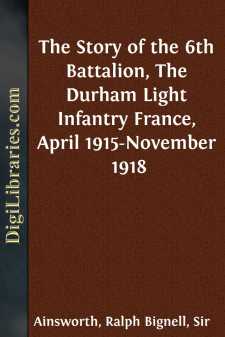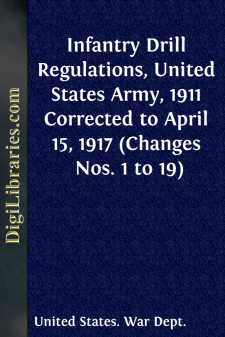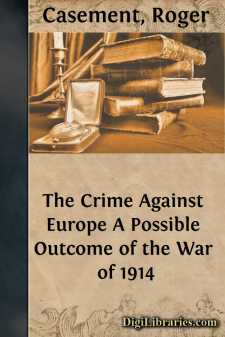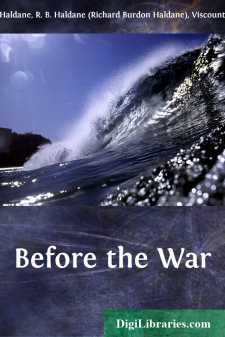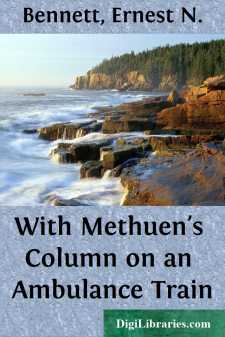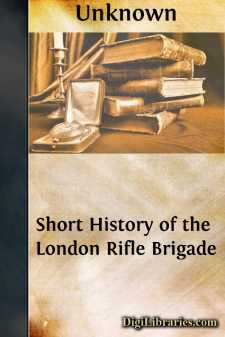History
- Africa 30
- Americas (North Central South West Indies) 50
- Ancient 68
- Asia 58
- Australia & New Zealand 8
- Canada 41
- Caribbean & West Indies 1
- Civilization 20
- Eastern Europe 12
- Europe 310
- Expeditions & Discoveries 60
- General 77
- Historical Geography 1
- Jewish 9
- Latin America 3
- Medieval 8
- Middle East 13
- Military
- Revolutionary 8
- Study & Teaching 5
- United States 353
- Western Europe 56
- World 13
Military Books
Sort by:
The "Salient." First Phase. The end of March, 1915, found the 50th (Northumbrian) Division of the Territorial Force awaiting orders to proceed overseas. The infantry of the Division consisted of the 149th Infantry Brigade (4th, 5th, 6th and 7th Battalions Northumberland Fusiliers), the 150th Infantry Brigade (4th Battalion East Yorkshire Regiment, 4th and 5th Battalions Yorkshire Regiment, and...
more...
CHAPTER I. England. Shortly after the commencement of the Volunteer Movement in 1859, many members of the newspaper and printing trades in Liverpool were desirous of forming a regiment composed of men connected with those businesses. A meeting was held in the Liverpool Town Hall, and the scheme was so well received that steps were taken towards the formation of a corps. Sanction was obtained, and on...
more...
CHAPTER I. SKETCH OF SOCIAL HISTORY. The Importation of the Africans—Character of the Colored Population in 1860—Colored Population in British West Indian Possessions—Free Colored People of the South—Free Colored People of the North—Notes. Professor DuBois, in his exhaustive work upon the "Suppression of the African Slave-Trade," has brought within comparatively narrow limits the...
more...
INTRODUCTION. 1. Success in battle is the ultimate object of all military training; success may be looked for only when the training is intelligent and thorough. 2. Commanding officers are accountable for the proper training of their respective organizations within the limits prescribed by regulations and orders. The excellence of an organization is judged by its field efficiency. The field efficiency...
more...
by:
Roger Casement
INTRODUCTION. The reader must remember that these articles were written before the war began. They are in a sense prophetic and show a remarkable understanding of the conditions which brought about the present great war in Europe. The writer has made European history a life study and his training in the English consular service placed him in a position to secure the facts upon which he bases his...
more...
CHAPTER I INTRODUCTION The purpose of the pages which follow is, as I have said in the Prefatory Note, to explain the policy pursued toward Germany by Great Britain through the eight years which immediately preceded the great war of 1914. It was a policy which had two branches, as inseparable as they were distinct. The preservation of peace, by removing difficulties and getting rid of...
more...
WITH METHUEN'S COLUMN ON AN AMBULANCE TRAIN. The first view of Capetown from the sea is not easily forgotten. We sailed into the bay just as the sun was rising in splendour behind the cliffs of Table Mountain. The houses of the town which fill the space between the hills and the sea were still more or less in shadow, picked out here and there by twinkling lights. On the summit rested a fleecy...
more...
by:
Unknown
PART I.Formation.The London Rifle Brigade, formerly the 1st London Volunteer Rifle Corps (City of London Rifle Volunteer Brigade), and now, officially, the 5th (City of London) London Regiment, London Rifle Brigade, familiarly known to its members and the public generally by the sub-title or the abbreviation "L.R.B.," was founded July 23rd, 1859, at a meeting convened by the Lord Mayor. It has...
more...
by:
William Lawrence
PREFACE. Sergeant William Lawrence died at Studland in Dorsetshire in the year 1867, bequeathing the manuscript of the accompanying autobiography to the family one of whose members now submits it to the notice of the public. Circumstances, which perhaps may be too often interpreted as really meaning an unfortunate tendency to procrastination, have hitherto prevented it being put into shape with a view...
more...
by:
John Adye
CHAPTER I EVENTS PRIOR TO, AND INCLUDING, FIRST AFGHAN WAR OF 1839-41 Proposed Invasion of India by Napoleon I.—Mission of Burnes to Cabul—Its Failure—Hostility of Russia and Persia—First Afghan War, 1839-41—Its Vicissitudes and Collapse. In considering the important and somewhat intricate subject of policy on the North-Western frontier of our Indian Empire it will be desirable, in the first...
more...


